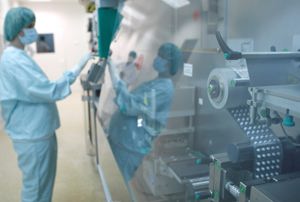A step two years late
The state has banned the import of drugs that fail to meet international production standards
Last week Ukraine’s Ministry of Public Health (MPH) finally decided to revise its requirements regarding the quality of what is sold in Ukrainian drugstores. It even hosted a meeting in order to discuss “certain questions regarding customs clearance of medication being brought to the territory of Ukraine.”
As the MPH official website reported earlier, the State Medications Quality Control Inspection is exploring the possibility of making changes to the Cabinet of Ministers resolution No. 902 of September 14, 2005, which will make it possible “to ban the registration of drugs produced in conditions that do not comply with the Good Manufacturing Practice standards.” This means the regulatory body is in fact suggesting dropping the practice of serial quality controls of the drugs imported by Ukraine, according to the ministry’s press service’s comments.
It will be recalled that in 2009 the provisions of Europe’s Good Manufacturing Practice (GMP) became mandatory for national producers. Yet, according to Oleksii Soloviov, chair of the State Service of Ukraine for Medicaments and Drug Control, while the situation with Ukrainian pharmaceutical factories is clear — there are clear-cut requirements and sufficiently strict control — foreigners are in a somewhat privileged position on the Ukrainian market, for they are only subject to serial controls. Conversely, the European approach suggests that all, including foreign, producers must be inspected for compliance with GMP guidelines. This applies to about 30 percent of the drugs that enter the Ukrainian pharmaceutical market. Most of these are manufactured in countries with weak regulatory systems. “From this angle, we find it really difficult to guarantee to our populace that imported drugs meet the requirements,” Soloviov noted. It is in fact for this reason that the State Medicaments Inspection proposed introducing changes to Cabinet resolution No. 376 that sets out the registration procedure and requirements. In particular, it is suggested that the resolution include a new clause which says that a certain drug can only be registered if there is proof that it is really produced in line with GMP standards.
Moreover, the State Medicaments Inspection head says, if the producer has already been checked by inspectors from a PIC/S member state, the Ukrainian side will conduct no additional inspections — it is sufficient to check the inspection statements to which this country has access as a PIC/S member. “As for countries with weak regulatory systems, it will be necessary to make an inspection tour of those countries,” Soloviov pointed out.
Meanwhile, the MPH hopes that the share of nationally-made medications, biotechnical preparations, including vaccines and serums, on the Ukrainian market will rise sharply — not only because foreign producers will be stripped of a “privileged position,” as the State Medications Quality Control Inspection suggests. The Ministry of Public Health has drawn up and put up for a debate a concept of the State Target-Oriented Program to Develop Import Substitution Production in Ukraine in 2011-21 which envisages that the national pharmaceutical industry will have satisfied the domestic demand for medicinal preparations at a level of at least 50 percent in terms of financial value and 85 percent in terms of the product range by 2021.
National producers of drugs have already applauded the health ministry’s initiatives. Yevhen Sova, sales manager of the Borshchahivka Chemical and Pharmaceutical Plant (Ukraine’s first pharmaceutical facility to adopt GMP standards), says that the ministry has taken a right step that will encourage the state to embrace international pharmaceutical practices. “I cannot name any developed country where it is still possible to register some drug without a GMP certificate, as is in the case of Ukraine,” Sova says. “Moreover, in the majority of states, the GMP certificate is subject to confirmation by a state inspection in which you want to register the substance. But there are some problems here: one inspection may register a drug and then come over a year later to check things, but another may not register it unless it examines by itself the conditions of manufacturing.”
The Borshchahivka Chemical and Pharmaceutical Plant believes that the two-year delay with banning the import of medicines that do not meet GMP standards was caused by the lack of funds and human resources. For one cannot seal the border without ample legal grounds. “You should visit the facility and check the conditions in which it makes drugs. Then you will come back and issue an order or an instruction for the customs or for somebody else, which will say that this producer is an undesirable person in Ukraine because his production process runs counter to standards. We cannot impose a ban just to be with it — we will be sued in this case,” the expert explains.
The Day’s FACT FILE
The GMP (Good Manufacturing Practice) standard is a set of regulations for organizing production processes and a system of quality control at pharmaceutical factories — beginning with the material from which the shop floor is made and the number of microorganisms per cubic meter of air, and ending with workers’ clothing and product package markings.






